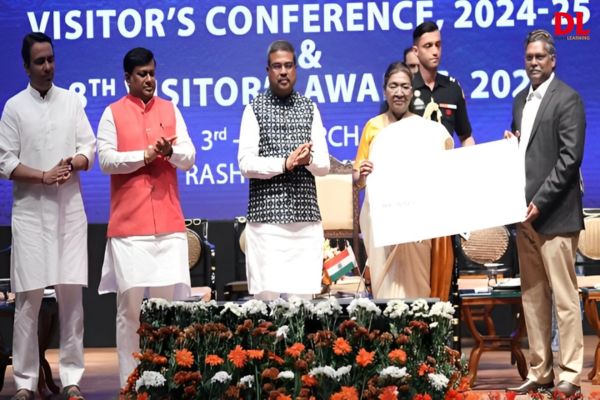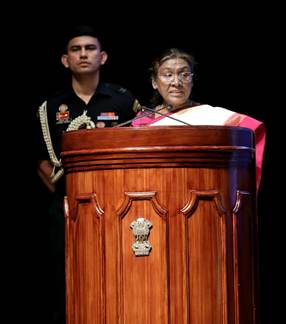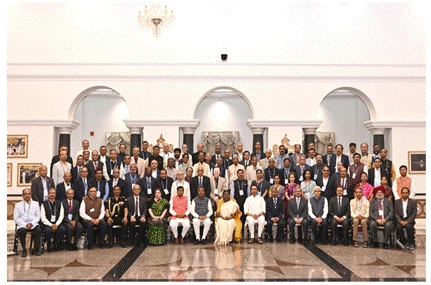
The Visitor’s Conference 2024-25, hosted at Rashtrapati Bhavan, marked a significant milestone in India’s higher education landscape, bringing together Vice Chancellors, Directors, and key stakeholders from Central Universities, IITs, NITs, and other prestigious institutions. Presided over by President Droupadi Murmu, the conference served as a vital forum for deliberations on policies, advancements, and challenges in the education sector.
Key Themes & Discussions
- Innovation in Higher Education: Exploring ways to enhance curriculum flexibility, integrate emerging technologies like AI and quantum computing, and adopt interdisciplinary approaches to problem-solving.
- Industry-Academia Collaboration: Strengthening partnerships between universities and industries to enhance employability, foster R&D, and drive economic growth.
- National Education Policy (NEP) 2020 Implementation: Reviewing progress and addressing challenges in adopting the NEP framework across institutions.
- Digital Transformation & Global Rankings: Strategies to improve digital infrastructure in education and enhance India’s standing in global university rankings.
- Sustainable Development Goals (SDGs) & Higher Education: Role of educational institutions in addressing climate change, sustainability, and social inclusivity.
Sessions & Key Participants
- Inaugural Address by the President of India: Emphasizing the role of higher education in shaping India’s future and promoting global research leadership.
- Panel Discussion on NEP 2020: With participation from policymakers, university leaders, and educators, this session delved into curriculum restructuring and holistic education models.
- Industry-Academia Synergy Roundtable: Featuring CEOs, academic heads, and research directors from leading organizations like DRDO, ISRO, and corporate R&D units, discussing ways to enhance innovation ecosystems.
- Session on AI & Digital Transformation in Education: Led by experts from NITI Aayog, IITs, and tech firms, highlighting the integration of AI, blockchain, and digital learning tools.
- Vice-Chancellors’ Conclave: A high-level discussion focusing on leadership in higher education, governance challenges, and the need for global collaborations.
Emphasizing Research and Innovation
President Murmu underscored the need for institutions to enhance their research capabilities to align with global standards. The discussions focused on strengthening interdisciplinary research, increasing industry-academia collaboration, and boosting investments in R&D.
Government initiatives such as the National Research Foundation (NRF) and Prime Minister’s Research Fellowship (PMRF) were highlighted as crucial steps in empowering scholars and scientists to drive cutting-edge innovations.
Internationalization of Higher Education
In light of India’s ambitions to establish itself as a global knowledge hub, the Visitor’s Conference 2024-25 addressed the internationalization of higher education. The New Education Policy (NEP) 2020’s emphasis on global partnerships, foreign faculty recruitment, and student exchange programs were central to the discourse. Enhancing the global rankings of Indian institutions and attracting international students remain key objectives.
Industry-Driven Curriculum and Employability
Bridging the gap between academia and industry has been a longstanding challenge. The conference stressed the importance of skill-based education and industry-aligned curricula to enhance employability. The integration of emerging technologies like AI, data science, and blockchain into academic programs was discussed to ensure graduates are equipped for the evolving job market.
Additionally, the role of vocational education and apprenticeship programs was emphasized to provide students with hands-on experience and practical skills.
Digital Transformation and EdTech Integration
As the world continues to shift towards digitalization, leveraging technology in education was a major focal point. The conference explored the role of EdTech solutions in making education more inclusive and accessible, especially for students in remote and underserved regions. Initiatives like SWAYAM, the National Digital Library, and hybrid learning models were discussed as pivotal tools in democratizing knowledge dissemination.
Social Responsibility and Sustainability in Education
Higher educational institutions were encouraged to actively contribute to society through social responsibility programs and sustainability initiatives. Universities were urged to integrate environmental consciousness into their curriculums and operations, aligning with India’s broader sustainability goals.
Also Read: Meritto, Info-Edge backed firm, aims for IPO of ₹500 crore this year
Strengthening Governance and Institutional Autonomy
Institutional autonomy and governance reforms were also a crucial part of the discussions. The need for decentralized decision-making, faculty empowerment, and performance-based evaluation systems were highlighted as key to improving institutional efficiency and academic excellence.
The Visitor’s Conference 2024-25 reaffirmed the government’s commitment to transforming higher education in India through innovation, collaboration, and policy reforms. As institutions implement these strategic initiatives, the future of higher education in India looks promising, with a stronger focus on research, employability, digital transformation, and global competitiveness.
This landmark event set the stage for a renewed approach to learning, ensuring that Indian institutions emerge as global leaders in education and research.





















